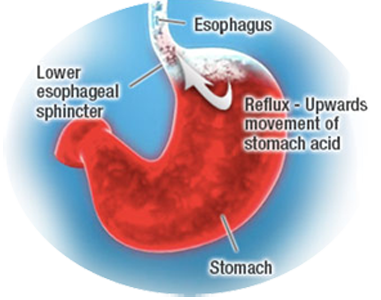Acid Reflux—GERD
Acid reflux, also known as GERD, is a common condition. Most people experience occasional acid reflux, but if you suffer frequent heartburn and discomfort, you might have GERD (gastroesophageal reflux disease). Understanding what triggers your acid reflux, recognizing common symptoms, and exploring both Western medical options and holistic approaches can empower you to manage your condition effectively. This guide will help you identify causes, spot symptoms, and consider a range of treatments—from medications and dietary adjustments to acupuncture and homeopathy—to find the relief that suits your lifestyle and needs.

Understanding Acid Reflux
The term GERD stands for gastroesophageal reflux disease, a chronic condition where stomach acid frequently flows back into the esophagus. This backflow, or acid reflux, can irritate the lining of your esophagus and cause symptoms that may affect your daily comfort and quality of life. Knowing how GERD develops and manifests is key to managing the condition effectively. By understanding the mechanisms behind GERD, you are better equipped to recognize symptoms, seek appropriate treatment, and adapt your lifestyle to reduce flare-ups.
GERD can cause esophageal inflammation or damage if untreated. Treatment options vary widely, ranging from medications and dietary changes to holistic approaches, all aimed at reducing acid reflux and improving your digestive health. Your ability to manage GERD hinges on understanding the triggers and symptoms that are unique to you.
What is acid reflux (GERD)?
Behind GERD lies the dysfunction of the lower esophageal sphincter (LES), a ring of muscle that acts as a valve between your stomach and esophagus. When the LES weakens or relaxes inappropriately, it allows acidic stomach contents to flow back up into the esophagus. This reflux leads to the irritation and inflammation that you experience as heartburn, regurgitation, or chest discomfort. While acid reflux occasionally affects many people, GERD is characterized by frequent or severe symptoms that interfere with your daily life.
Because your esophagus is not designed to handle stomach acid, the persistent exposure you experience with GERD can cause symptoms such as difficulty swallowing, sore throat, and even chronic cough. Understanding this medical condition involves recognizing that it is a long-term disorder requiring consistent management through lifestyle adjustments, medication, or complementary therapies.
Causes of GERD
Along with a weak lower esophageal sphincter, several factors can contribute to the development of GERD. These include obesity, which increases abdominal pressure and forces stomach acid upward; certain foods and drinks like spicy foods, alcohol, and caffeine; smoking; and conditions such as hiatal hernia. Each of these elements can exacerbate acid reflux by either relaxing the LES or increasing acid production in your stomach, leading to the symptoms you experience.
Your eating habits also play a significant role in how often you may suffer from acid reflux. Large, heavy meals or lying down soon after eating can cause the stomach contents to push back into the esophagus. Stress and pregnancy can additionally influence GERD by altering your digestive system’s normal function, making it more likely for acid reflux to occur.
Furthermore, medications such as certain asthma treatments, antihistamines, painkillers, and blood pressure drugs can relax the LES, worsening acid reflux symptoms. Being aware of these factors helps you identify and reduce potential triggers. By addressing these causes through lifestyle changes and tailored treatments, you can manage GERD more effectively and diminish the frequency and severity of your symptoms.
Symptoms of GERD
Some of the most recognizable symptoms of GERD (gastroesophageal reflux disease) involve discomfort caused by acid reflux. When stomach acid flows back into your esophagus, you may feel a burning sensation known as heartburn, especially after eating or when lying down. Along with heartburn, you might experience regurgitation, where acid or food comes back up into your throat or mouth, creating an unpleasant sour or bitter taste. These symptoms can often interfere with your daily activities or sleep, signaling the need to address the condition effectively.
In addition to these typical signs, you might notice other symptoms like difficulty swallowing, a persistent sore throat, or a chronic cough that does not seem tied to other respiratory issues. You may also find that the symptoms worsen after consuming certain foods or drinks, such as spicy meals, caffeine, or alcohol. Recognizing these symptoms early can help you seek appropriate treatment and avoid complications.
Common Symptoms
In addition to heartburn and regurgitation, you may experience chest discomfort or pain, which resembles heart-related issues but is often associated with acid reflux. This chest pain can be sharp or burning and may occur sporadically. You may also notice frequent burping, a feeling of fullness, or bloating, which can sometimes be mistaken for other digestive issues.
Another widespread symptom is the sensation of a lump in your throat, called globus sensation, which can be uncomfortable and lead to frequent throat clearing. If you experience these common symptoms regularly, it’s important to monitor their frequency and severity and discuss them with your healthcare provider for proper diagnosis and management.
Severe Symptoms
By contrast, severe symptoms of GERD may indicate damage to your esophagus or more serious health concerns. These can include persistent difficulty swallowing (dysphagia), which suggests narrowing or inflammation in your esophagus. You might experience unintentional weight loss due to pain or trouble eating, which requires immediate medical evaluation.
Other severe symptoms can include vomiting blood or having black, tarry stools, both signs of bleeding in your digestive tract. If you notice any of these symptoms, it’s imperative to seek urgent medical attention to prevent further complications and receive timely treatment.
At later stages of GERD, not treating acid reflux can cause problems like esophagitis (swelling of the esophagus), esophageal strictures, or Barrett’s esophagus, which raises the chance of getting esophageal cancer. Understanding the severity of your symptoms helps you and your healthcare provider decide on the most appropriate treatment strategy to manage the condition effectively and protect your long-term health.
Western Treatments for GERD
There’s a range of Western treatment methods designed to manage GERD (gastroesophageal reflux disease) and its symptoms, primarily focusing on reducing acid reflux and healing the esophagus. These treatments are generally effective in managing the condition, particularly when combined with lifestyle changes like dietary adjustments. Since GERD can lead to complications if left untreated, seeking appropriate care is important if you frequently experience symptoms such as heartburn, regurgitation, or chronic cough.
Many individuals find relief using a combination of medications or, in some cases, surgical intervention if symptoms persist despite medical therapy. Western treatments provide a structured and evidence-based approach to control acid reflux and help you maintain a better quality of life while minimizing discomfort and potential damage to your esophagus.
Medications
Above all, medications are often the first line of treatment for GERD. Your healthcare provider may recommend antacids to neutralize stomach acid or H2 receptor blockers that reduce acid production, offering immediate relief from occasional heartburn. For more frequent or serious symptoms, doctors often prescribe proton pump inhibitors (PPIs) because they effectively stop acid production and help the esophagus heal over time.
In addition to these, prokinetic agents might be advised to improve stomach emptying and reduce reflux episodes. When using medications, it’s important to follow your provider’s instructions carefully and discuss any long-term use, as some GERD medications may have side effects if taken for extended periods. Monitoring your symptoms and medication effects can help ensure the best outcomes for managing your GERD.
Surgical Options
Below the threshold where medications no longer provide adequate symptom control, surgical options become viable for managing GERD. One common procedure is fundoplication, where the top of your stomach is wrapped around the lower esophageal sphincter to strengthen it and prevent acid reflux. This surgery can significantly reduce symptoms and reliance on medications, especially if you suffer from severe reflux or complications like esophagitis.
Besides fundoplication, you might encounter less invasive techniques such as LINX device implantation, where a ring of magnetic beads is placed around the esophagus to enhance the sphincter’s function without disrupting normal swallowing. These surgical treatments are usually considered after thorough evaluation and when lifestyle changes or medications fail to give enough relief.
Options for surgical intervention often depend on the severity of your GERD, your overall health, and your personal preferences. While surgery can offer long-term relief, it’s important to discuss potential risks and benefits with your healthcare provider to decide if it aligns with your treatment goals. Post-surgery, you will still need to maintain certain lifestyle habits to optimize the success of the procedure and prevent recurrence.
Holistic Treatments for GERD
Your approach to managing GERD can extend beyond conventional medications and procedures by incorporating holistic treatments. These methods focus on balancing your overall well-being, which can help reduce the frequency and severity of acid reflux symptoms. Holistic treatments often include dietary adjustments, lifestyle modifications, and alternative therapies that work synergistically to support your digestive health and reduce inflammation in the esophagus.
By exploring holistic options, you may find relief without solely relying on pharmaceutical interventions. These treatments can complement your existing GERD management plan and empower you to take an active role in your health. However, it’s important to work with your healthcare provider to ensure that any holistic approach fits safely with your individual medical needs.
Dietary Changes
GERD symptoms often respond positively to targeted dietary changes, which can help prevent acid reflux and ease discomfort. You can start by identifying and avoiding common trigger foods such as spicy dishes, citrus fruits, chocolate, caffeine, and fatty or fried foods. Including smaller, more frequent meals rather than large portions may also help reduce pressure on your lower esophageal sphincter, the muscle that keeps stomach acid from rising.
Additionally, incorporating more alkaline and easily digestible foods like oatmeal, green vegetables, and lean proteins can promote better digestion and reduce acid production. Drinking plenty of water and avoiding eating close to bedtime can further minimize your symptoms. These dietary adjustments empower you to take control of your GERD through practical, everyday choices.
Alternative Therapies
Alternative therapies for acid reflux and GERD: many individuals turn to complementary methods such as acupuncture, homeopathy, and relaxation techniques to support their treatment journey. Acupuncture is believed to help by stimulating certain points on the body, which may improve digestion and reduce inflammation, while homeopathic remedies are tailored to your specific symptoms and constitution to promote overall digestive health.
These therapies can be effective additions to your treatment, particularly if you are seeking a more natural way to manage chronic acid reflux without increasing medications. It is important to consult qualified practitioners to ensure that alternative treatments are appropriate for your condition.
With alternatives like acupuncture and homeopathy, you gain access to personalized approaches that address not only your acid reflux symptoms but also the underlying factors contributing to your digestive imbalance. These therapies often focus on enhancing your body’s natural healing processes, which may lead to sustained symptom relief and improved quality of life when used alongside mainstream medical care.
Acupuncture and Homeopathy for Acid Reflux
Unlike conventional Western treatments that often focus on medications and lifestyle changes to manage GERD, acupuncture and homeopathy offer alternative approaches aimed at addressing the root causes of your acid reflux symptoms. These holistic methods emphasize restoring balance within your body, potentially providing relief without relying solely on pharmaceuticals. By exploring these options, you might discover complementary therapies that work alongside your existing treatment plan for a more comprehensive approach to managing GERD.
Both acupuncture and homeopathy have gained popularity among those seeking natural treatments for chronic acid reflux and GERD. While scientific research is ongoing, many people find these methods helpful in reducing symptoms such as heartburn, regurgitation, and discomfort. Evaluating these options could give you additional tools to improve your quality of life, especially if conventional methods alone are not fully effective for your condition.
Acupuncture for GERD
Against the backdrop of standard acid reflux treatments, acupuncture offers a non-pharmaceutical option that involves stimulating specific points on your body, usually with fine needles. This practice aims to regulate the flow of energy and improve digestive function, which might help decrease the frequency and severity of your acid reflux episodes. Several studies suggest that acupuncture can promote esophageal motility, reduce inflammation, and balance gastric acids, potentially alleviating GERD symptoms.
If you consider acupuncture for GERD, it typically becomes part of a broader treatment strategy, complementing dietary changes and medications. Although individual responses vary, many patients report noticeable symptom improvement after several sessions. Consulting a licensed acupuncturist experienced in treating digestive disorders can help tailor the process to your specific needs, ensuring a safe and potentially effective intervention for your acid reflux.
Homeopathic Remedies for Acid Reflux
Across the spectrum of holistic approaches, homeopathy is another option people explore for chronic acid reflux and GERD. This system uses highly diluted natural substances intended to stimulate your body’s self-healing mechanisms. Common homeopathic remedies for acid reflux include Nux vomica, which is often recommended if your symptoms arise after overeating or stress, and Natrum phosphoricum, which may help neutralize excess stomach acid.
You should be aware that homeopathic remedies for GERD are selected based on your unique symptom pattern rather than a one-size-fits-all approach. Practitioners conduct a detailed assessment to determine the best remedy tailored specifically for your acid reflux symptoms, aiming for long-term symptom relief and improved digestive health.
With homeopathic treatment, it’s important to work with a qualified homeopath who can guide you through selecting appropriate remedies and monitor your progress. While many people find relief through this gentle approach, combining homeopathy with conventional treatments and lifestyle adjustments often yields the most balanced and effective results for managing your GERD symptoms.
Lifestyle Modifications for Acid Reflux
All effective management plans for GERD involve making thoughtful lifestyle modifications that can significantly reduce acid reflux episodes and improve your overall digestive health. Simple changes in your daily routine, including dietary adjustments, weight management, and sleep positioning, can help control the frequency and severity of symptoms. By adopting healthier habits, you take active steps toward minimizing the irritation caused by acid reflux and supporting the healing process of your esophagus.
Addressing lifestyle factors also empowers you to complement medical treatments, whether you are using medications or exploring holistic options. Making these modifications can lower your dependence on medications while enhancing your quality of life by reducing discomfort and preventing complications associated with GERD.
Eating Habits
Between meals, the timing and content of what you eat play a significant role in managing acid reflux. Eating smaller, more frequent meals instead of large portions helps prevent excessive stomach distension that can trigger the reflux of stomach acid into the esophagus. Additionally, giving your body at least two to three hours after eating before lying down can substantially reduce the chance of nighttime symptoms.
It’s also wise to be mindful of foods and beverages that may worsen your acid reflux symptoms. Common triggers include spicy foods, caffeine, chocolate, and carbonated drinks. By observing how your body reacts and gradually adjusting your diet, you can create a personalized eating plan that supports digestive comfort and reduces the frequency of acid reflux episodes.
Stress Management for Acid Reflux
Across your daily routine, managing stress effectively can influence the severity of GERD symptoms. Stress has been shown to exacerbate acid reflux by increasing stomach acid production and affecting gut motility, which can lead to more frequent and intense episodes. Incorporating relaxation techniques such as deep breathing, meditation, or gentle yoga can help regulate your body’s stress response and promote digestive health.
Consistent stress management not only aids in reducing acid reflux but also improves your overall well-being. When you make time to address mental and emotional health, you support your body’s ability to function optimally, including digestion, which can lessen GERD-related discomfort.
With regular practice, stress reduction methods can become an integral part of your routine, helping you to maintain better control over chronic acid reflux. Combining these techniques with other lifestyle and dietary changes enhances their effectiveness, allowing you to approach GERD treatment holistically and with greater confidence.
To wrap up
Drawing together what you have learned about GERD, you can see that this condition results from the backflow of stomach acid into the esophagus, causing discomfort and potential damage. Understanding the causes, such as lifestyle factors, diet, and anatomical issues, helps you take control of your symptoms. Recognizing common signs like heartburn, regurgitation, and difficulty swallowing allows you to seek appropriate care early and avoid complications.
When considering treatment, you have options ranging from conventional medications and dietary changes to holistic approaches like acupuncture and homeopathy. By exploring these Western and natural therapies, you can tailor a treatment plan that suits your needs and preferences. Managing GERD effectively involves a combination of medical advice and self-care strategies, empowering you to improve your quality of life while minimizing acid reflux symptoms.
Say goodbye to heartburn caused by acid reflux and develop a healthy body at Viva Healthy Life. Use natural remedies for acid reflux
There is positive news: “You don’t have to be dependent on these unsafe medications. Here at Viva Healthy Life, Dr. Tsan and a team of holistic practitioners developed a simple treatment protocol using only natural remedies for acid reflux. This protocol combines acupuncture, homeopathy, and phytotherapy (herbal medicine), and this treatment will terminate gastroesophageal reflux forever.”
Envisage yourself free from acid reflux for the rest of your life. Switch to at home remedies for acid reflux
Like many of our patients, you have a good chance to be free of acid reflux in 7–10 days, or even less, by using effective, safe, and natural remedies.
But the most important thing is that when our patients report improvement of the symptoms of gastroesophageal reflux, they also realize that the other health issues disappear as well. Furthermore, most of them experience
- Deep sleep and a lot of energy in the morning
- Improvement of immune system functionality
- Energizing
- Weight stabilization
These improvements from using holistic remedies for acid reflux are precisely the opposite of what happens when they take Nexium, Prilosec, and other acid-blocking drugs.
During the clinical study period, we treated 100 volunteers, and 98 of them reported significant improvements. After 1 year, the statistics are as follows:
- 75 patients are free of acid reflux and do not need any medication.
- 18 patients came back to our office when the symptoms returned. They received additional treatment consisting of natural remedies for acid reflux and have felt excellent since that time.
- 5 patients received 2 additional courses of natural treatment for acid reflux and feel great;
- We were unable to help two patients who did not report any improvements.
Please refer to our real acid reflux patients’ testimonials below:
Carol Podder, DO
 My name is Dr. Podder. I suffered from acid reflux for years. Prilosec and Nexium were my daily medications. I understood that these drugs are not safe, but there was nothing I could do. One year ago, Dr. Tsan told me that he and his partners developed a new treatment protocol for GERD that heals it naturally and forever. He proposed that I become a volunteer in his clinical study. That was probably the happiest day of my life. Two weeks after beginning treatment using natural remedies for acid reflux, my heartburn is gone, and two months later I forgot I ever had this problem. That was the real cure.
My name is Dr. Podder. I suffered from acid reflux for years. Prilosec and Nexium were my daily medications. I understood that these drugs are not safe, but there was nothing I could do. One year ago, Dr. Tsan told me that he and his partners developed a new treatment protocol for GERD that heals it naturally and forever. He proposed that I become a volunteer in his clinical study. That was probably the happiest day of my life. Two weeks after beginning treatment using natural remedies for acid reflux, my heartburn is gone, and two months later I forgot I ever had this problem. That was the real cure.
Simon Weinstein

I suffered from gastroesophageal acid reflux for years. It started after excessive consumption of alcohol. My stomach punishes me every day for violating my diet. Heartburn killed me. I underwent natural treatment for acid reflux at Viva Healthy Life performed by Dr. Tsan and Dr. Selcova. I experienced a complete transformation. It sounds like a miracle, but it’s true. I’m so happy to be reflux-free!
Anna Meyers
 This is an amazing natural treatment for acid reflux. My family physician has “sentenced” me to Nexium for the rest of my life. Fortunately, I met Dr. Tsan, who informed me that his team is conducting clinical trials for a new natural treatment protocol for acid reflux. I immediately expressed my willingness to participate, and that’s how it all began. It was in February 2014, and since then, I have never had any symptoms of acid reflux again.
This is an amazing natural treatment for acid reflux. My family physician has “sentenced” me to Nexium for the rest of my life. Fortunately, I met Dr. Tsan, who informed me that his team is conducting clinical trials for a new natural treatment protocol for acid reflux. I immediately expressed my willingness to participate, and that’s how it all began. It was in February 2014, and since then, I have never had any symptoms of acid reflux again.
See more patients’ testimonials at RateMD.com
If you suffer from acid reflux and need treatment, if you’re ready to say goodbye to acid-blocking medications, use the widget below to schedule the initial comprehensive evaluation, and Dr. Tsan will discuss your best treatment options.
You must be logged in to post a comment.